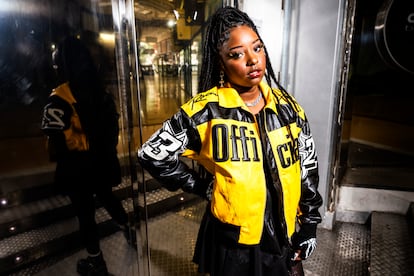J Noa, the Dominican rapper nominated for the Latin Grammys: ‘I am the voice of the crowd’
The 18-year-old artist, who wrote her first song when she was eight, sings about life in the marginalized neighborhoods of the Dominican Republic

At just 18 years old, Nohelys Jiménez — better known as J Noa — is nominated for the 24th edition of the Latin Grammy Awards. Her song Autodidacta, which is competing in the category of best rap/hip hop song, describes her just as she is. She grew up in a marginalized neighborhood in San Cristóbal, a province in the south of the Dominican Republic, and is the daughter of a single mother. “I consider myself self-taught because I grew up in a place where you have to learn on your own. Everything I know about rap, I learned on my own,” says the singer.
J Noa’s bars and punchlines are about teenage pregnancies, juvenile delinquency, criticisms of her country’s government and even suicide. “My idea is to be different, unlike anyone else. To do things well. It’s something that goes beyond being an artist; it has more to do with your self-esteem and personality,” says the singer, who is also known as “la hija del rap” (the daughter of rap).
Question. How did you become a rapper?
Answer. I started when I was five and I used to see the neighborhood boys rapping. That’s where my love for music began. At eight I had already written my first song.
Q. What in your environment inspired you to write?
A. My first songs were about what I saw at school. The experiences of an ordinary girl: the games, the mess, the fights in the yard. Then I noticed the problem of crime in the neighborhood, early pregnancies and dysfunctional families. My lyrics are inspired by what I saw growing up.
Q. Your lyrics are of social denunciation, but these days what sells most in urban music is flexing and sex.
A. I am not one more in the crowd; I consider myself the voice of that crowd that is in vulnerable situations. I do it so that society knows what’s in the neighborhood, which they can’t see, and the people who live there don’t know how to express, or are not heard.
Q. Have you ever been pressured to write about other kinds of topics?
A. I’ve been criticized by people who say that I should change my lyrics for something more commercial. But I don’t care about that, because I have an audience that respects what I do. Those who criticize just don’t understand my art. Nobody distracts me from what I’m doing.
Q. At only 18 years old you have signed with Sony, you have been nominated for the Latin Grammys and you have been featured in the NPR series Tiny Desk Concerts. Did you expect all this notoriety and recognition?
A. I always trusted my talents. At school, I stood out as an outstanding student, but also as the class rebel. I’ve always had a strong personality. Nobody thought I could achieve all this, and it makes me feel good to be representing my country with something positive.
Q. How did the signing with Sony happen?
A. They got in touch through Instagram, because my rapping videos caught their attention. My manager, Johan Tibrey, who is my cousin, contacted them, they reached an agreement and we signed when I was 15.
Q. What has changed in your life since then?
A. I am still focused on my music, except that now I alternate between Miami and the Dominican Republic. But I still live in my native San Cristóbal. I have improved professionally and financially; I have changed for the better because I am surrounded by professionals who support me a lot and guide me.
Q. What do you think of the hypersexualization of women in urban music?
A. I do not sexualize my art. I am careful with the image I want to show. I don’t know if I will change my mind in the future. I respect the artists who do it, but at the moment it’s not in my plans.
Q. Who are your musical influences?
A. When I started, I only went by what I saw my neighbors doing, which was freestyle. When I grew up and had access to the internet and social media, I began to be inspired by Dominican and international artists; but my greatest musical influence is the neighborhood.
Q. In the song Betty you tell the story of a pregnant teenager who falls into the world of drugs. You end the song with the phrase “Lo que le pasó a Betty te puede pasar a ti, solo espero que tus decisiones no sean igual” (What happened to Betty can happen to you, I just hope your choices are not the same). Can you choose when you grow up in a dysfunctional environment?
A. I am an example that you can choose a different path. The environment is no excuse for making poor choices. Many things fail in our society, but if you have the opportunity to study, study; until your time comes. That’s what life is about. Things come in due time. It’s a whole process.
Q. Autodidacta starts with the line “Exclusiva antirracista” (Exclusive anti-racist). What do you think about racism in the Dominican Republic? Have you been attacked because of the color of your skin?
A. In the Dominican Republic there is a prejudice against Black people, but we all know that we have Black African ancestry. I have been attacked on social media because of my color, but it doesn’t get to me. I don’t pay attention to them, but I condemn racism and I know I’ll have to keep talking about it.
Q. In La niña you speak openly about suicide, bullying and depression in youth. Have you experienced it up close?
A. I wrote that song for a friend who was going through that situation. I asked her for permission to write it. I grew up in a country where mental health is not paid attention to, and I felt the need to address it.
Q. Does it bother you to be labeled as an “activist artist”?
A. No, because that’s what I talk about in my songs; about contributing something positive to society.
Q. You address many other topics in your lyrics, from the lack of opportunities for young people in marginal neighborhoods to the high price of the electric bill. What social cause do you identify most with?
A. I experienced teenage pregnancy very closely. Sexism, too.
Q. Have you felt sexism in the music industry?
A. Not yet, but the day that happens it will be a great trigger, because I don’t keep quiet for anyone. I have no limitations to defend myself.
Sign up for our weekly newsletter to get more English-language news coverage from EL PAÍS USA Edition
Tu suscripción se está usando en otro dispositivo
¿Quieres añadir otro usuario a tu suscripción?
Si continúas leyendo en este dispositivo, no se podrá leer en el otro.
FlechaTu suscripción se está usando en otro dispositivo y solo puedes acceder a EL PAÍS desde un dispositivo a la vez.
Si quieres compartir tu cuenta, cambia tu suscripción a la modalidad Premium, así podrás añadir otro usuario. Cada uno accederá con su propia cuenta de email, lo que os permitirá personalizar vuestra experiencia en EL PAÍS.
¿Tienes una suscripción de empresa? Accede aquí para contratar más cuentas.
En el caso de no saber quién está usando tu cuenta, te recomendamos cambiar tu contraseña aquí.
Si decides continuar compartiendo tu cuenta, este mensaje se mostrará en tu dispositivo y en el de la otra persona que está usando tu cuenta de forma indefinida, afectando a tu experiencia de lectura. Puedes consultar aquí los términos y condiciones de la suscripción digital.









































